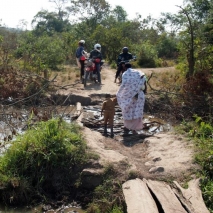Kwa Wazee is an NGO
that has been running a comprehensive support programme for older people in Muleba district, Tanzania since 2003. The central component of the programme is
a pension targeted at older people with little family support or with care
responsibilities for orphans and vulnerable children. In June 2013 older people received a monthly pension of TZS12,000 (US$7.50) plus an additional supplement
of TZS7,000 (US$4.40) for each child in their care. The scheme reached around
1,100 older people and 600 children. As one of only a few cash transfer
programmes in Tanzania, and the one most directly focused on older people, Kwa
Wazee can provide important insights into how a social pension could be
implemented across the whole of Tanzania. In this blog Stefan Hofmann and Mandy
Heslop look at what can be learnt from the Kwa Wazee programme. You can find
more information about this research in here.
 A couple of years ago, during the fieldwork for an impact evaluation of old age pensions in the Kagera Region in Tanzania we spent one
A couple of years ago, during the fieldwork for an impact evaluation of old age pensions in the Kagera Region in Tanzania we spent one
day in Ngenge, which seemed to be the most remote and most disadvantaged area
we had been to. In recent years the introduction of a social pension in
Tanzania, but also in other Eastern African countries, has moved from a mere
vision to a real possibility. As social pensions in these countries will have
to be delivered to remote locations like Ngenge, the focus of the new study was
to learn about how pensions can be delivered in these particularly remote
settings, but also to establish what impact the pension was continuing to have.
The challenges of the
research
Challenges related to doing research with older people in
remote rural settings are not only the distances to cover, but also their
health and mobility and the fact that the majority of them don‘t read and
write. This was partly overcome with the participation of the children who are
in the care of the older people: for one
month children and older people meticulously documented all the income and
expenses of 182 older person headed households in Ngenge Ward. This was an
intergenerational process, a social process and a form of data collection which
was probably unprecedented.
The impacts of the
pension
The survey revealed that even a small pension of TZS 12,000
a month, which corresponds to 13% of GDP per capita, has a dramatic impact on
income – increasing the average income of recipient households by almost 80%.
This translated to an increased quantity and variety of food, more spending on basic household items and
more spending on healthcare compared to households without cash transfers.
While one third of all pensioners were able to invest in daylabourers to
improve their farms, none of the households who didn‘t receive the pension or
child supplements spent their money in this way. Some people argue that
pensions reduce the support that older people are given by their family or
community. However this was not the case and their position in the reciprocity
process was actually strengthened – as they received more gifts and loans than
non-pensioners.
The difficultly of targeting
While the impacts of the pension were very positive the
study confirmed the difficulties of means-testing in an environment of
widespread poverty. None of the non-pensioners had the same income as the
better off pensioners and many non-pensioner households were found to have the
same income as the poorest pensioner households. One pensioner expressed this
dilemma:
‘Other older people
are pointing their finger at us … if we all got it, they would stop shouting
and pointing.’
Delivering a pension
in a rural area
Regarding the practical aspects of implementing a pension
scheme, the study shows that reliable delivery is possible even under difficult
conditions. But it also points to some specific considerations that need to be
taken in to account in reaching older people in remote areas:
- Mobility was a major challenge. 40% of pensions could not
be collected by older people themselves due to extremely long walking distances
combined with physical disabilities. Only 5% of those who collected their money
themselves stated that walking caused them no problems; two thirds found it
painful. - Eyesight was also an issue. Even among the
self-collectors, just over 50% reported that they could not recognise people
from more than 10 metres away. One out of four could not recognise the animal
pictured on the banknote. - The vast majority of older people had either voting passes
or birth certificates, but an important minority of 8% had no identification at
all.
This research showed that one potential way of overcoming
issues of remoteness is through the use of electronic payments. However, in the
peripheral location of Ngenge mobile phone technlology is less advanced than in
other areas of Tanzania. Only 15% of older people had a phone in their home
(compared to 46% in neighbouring Nshamba) although 66% (compared to 82%) had
access to a mobile phone in their vicinity. Special efforts would therefore be
needed to improve access to phone networks and services in such remote areas.
While electronic payments could overcome some of the issues of remoteness it is
obvious that a significant number of older people would need special support –
by their family or by the community – to access their pensions in this way. However, as we have seen there are many older
people who require support to collect their pension in the more traditional
way.
Older people were ambivalent about the ability of the
government to reliably deliver the cash transfer, referring to previous failures in the
health sector and in emergencies. They therefore saw it as critical that older
people are included in the design, the delivery and monitoring of a national
pension scheme at all levels.
